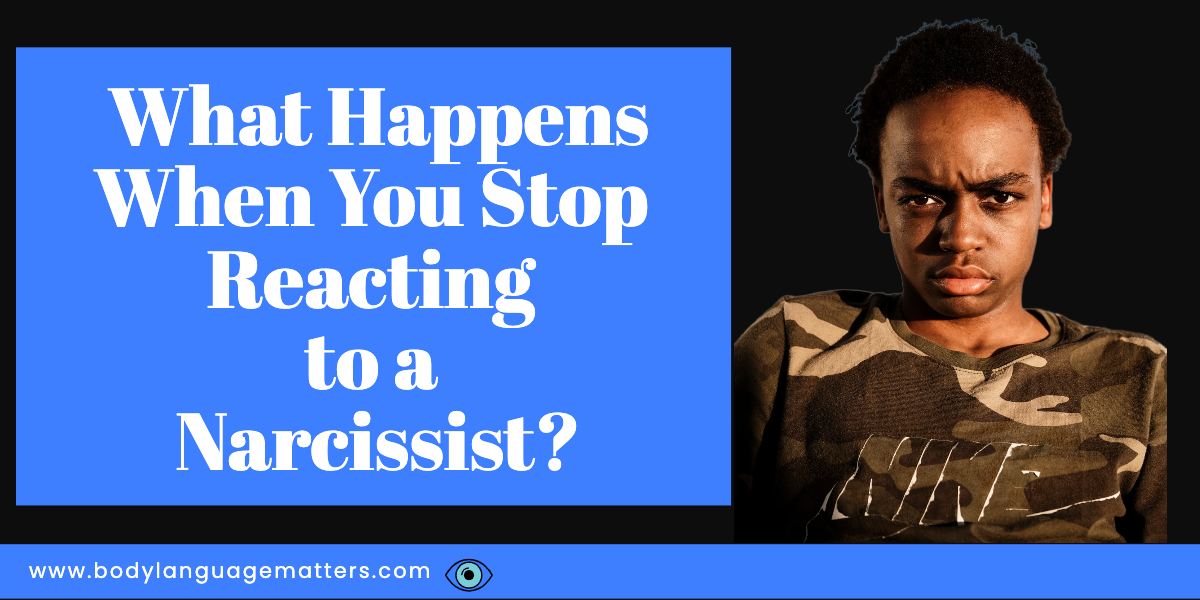When it comes to a narcissist the best thing you can do is not to react to them or show them any emotion at all. But this is easier said than done we will take a look into how you should handle and not react to a narcissist in the article.
The most common response to narcissistic abuse is to keep reacting. This sometimes happens because the victim genuinely cares about the narcissist or because they have been manipulated into thinking that the narcissist cares about them. However, there comes a point where it is necessary to stop reacting. This can be difficult, but it is important for the victim’s mental and emotional health.
When the victim stops reacting, the narcissist is forced to confront their own behavior. This often leads to the narcissist becoming angry or aggressive. In some cases, it may even lead to the narcissist leaving the victim alone but that is all subjective.
It can be helpful to not react to some events, like when we are in a relationship with someone who is emotionally abusive. Often times they’re self-centred and will get mad at you for things that is their fault. If you are in any physical danger, this isn’t the article for you. If you try these techniques, it could backfire on you.
Why Do Narcissists Hate It When You Stop Reacting?
When you stop reacting to a narcissist, they will get worse because they will no longer be able to control you. They will have to feel their own pain, their own fears, and their own insecurities.
One of the ways a narcissistic person works is by making you react so they can live their emotions through you. If you stop reacting to what they’re trying to provoke in you, you’re stopping them from getting their way.
Expect It To Get Worse.
When you first stop reacting to the narcissist, their behavior towards you will get worse. They won’t know what’s going on, and they’ll quickly ramp up their efforts to try and trigger you so you’ll empty your emotions onto them, that’s what a narcissist feeds off.
Take Control Of Yourself Of All Times.
It can be easier to have that fight or argument to get it over with. That’s what the narcissist wants from you, they feed off of this and will do almost anything to get that reaction from you. It’s really important to stay in control of yourself and know what you’re trying to achieve.
5 Things That Happen To You Once You Stop Reacting To A Narcissist!
It is hard to break free from a narcissistic partner or parent. It takes time, patience and a lot of courage to leave a relationship when it has been toxic for so long.
1. Practice Emotional Detachment.
When you first decide to end the relationship with a narcissist, you are still emotionally attached to that person. You have to detach and make their words irrelevant to you. You have to be super aware of your own thoughts and feelings because the narcissist will try everything in his power to bring you back into the relationship.
2. Anger Management.
You have to rearrange your own anger management style. It can be hard at first to understand this concept but if you have been in a relationship with a narcissist for a long time they will have been manipulating you and making you feel bad about yourself triggering you into a higher than normal emotional reaction. They need to feed off but now you have removed them from your life your reactions could be x10 more than they need to be.
So pay attention to how you react to people if you get angry and try to calm yourself down into a normal state of emotions.
3. Understand Your Body Language.
After being around a narcissist, your body language would have changed to become more defensive. It can be hard to notice this kind of nonverbal behavior, but with a little practice, you can start to open up more. Check out our positive body language article here.
4. Find Yourself Again.
You will have changed after years of being in a relationship with a narcissist. Finding out who you are now could be a challenge but one you need to do in order to move on with your life.
It’s hard to know yourself after being with a narcissist for any length of time. It is important to remind yourself of the truth about yourself and not let a narcissist take away your confidence.
5. Build Your Confidence Back Up.
A narcissist would have knocked you down repeatedly to make you feel better. It’s time for you to build your confidence back up and get back on the horse so to speak. Find your decency, and your core values, and build that confidence back up again.
It’s been a long time since you’ve felt good about yourself and what you’ve accomplished. You’re tired of feeling like a failure. It’s time to take charge of your life again, find your decency and put the narcissist behind you.
What Happens To The Narcissists Once Your Stop Reacting?
After a break-up with a narcissist, the first thing that will happen is they will be deeply offended and play the victim. They will try every trick in the book to get you back, critique, and complain to your friends. But remember that the narcissist is coming from a place of paranoia, insecurity, and shame, but will never admit it or even realize it.
Common Questions And Answers
1. What are the benefits of stopping reacting to a narcissist?
There are a number of benefits to stopping reacting to a narcissist. One benefit is that it can help to reduce the amount of drama in your life. Another benefit is that it can help you to maintain your own sanity and emotional well-being. Additionally, it can help you to protect yourself from further emotional and/or physical harm.
2. What are the challenges you might face when trying to stop reacting to a narcissist?
Narcissists are experts at manipulating people and getting them to react to them. They may use a variety of tactics, such as guilt-tripping, playing the victim, or anger-baiting, to get you to react to them. It can be difficult to break this pattern of reacting to a narcissist, but it is possible. Some tips for how to stop reacting to a narcissist include:
- Identifying the narcissist’s tactics and learning to recognize them.
- Setting boundaries with the narcissist and not allowing them to draw you into an argument.
- Focusing on your own needs and wants, rather than reacting to the narcissist.
- Disengaging from the narcissist by limiting your time with them.
3. How can you tell if you’re successfully stopping reacting to a narcissist?
The only way to be sure you’re successfully stopping reacting to a narcissist is to never interact with them again. If you find yourself getting upset or defensive in response to something they’ve said or done, it means you’re still reacting to them.
4. What are some strategies for stopping reacting to a narcissist?
There is no one-size-fits-all answer to this question, as the best way to deal with a narcissist may vary depending on the individual situation. However, some suggested strategies for managing or stopping reactions to a narcissist include:
- Identifying and acknowledging your own personal triggers, and working to avoid or de-escalate situations that may trigger them.
- Establishing and maintaining clear boundaries with the narcissist, and being assertive in communicating these boundaries to them.
- Practising self-care, including making time for yourself and your own interests outside of the relationship with the narcissist.
- Seeking support from trusted friends or family members, or professional help from a therapist or counsellor.
Summary
Narcissistic abuse can leave you feeling drained, depleted, and disempowered. You may find yourself constantly walking on eggshells in an attempt to keep the peace. But when you stop reacting to a narcissist your life will change, a weight will be lifted from your shoulders, your life will get better and you will become more fluid and you will become happy again or at the very least have a more positive outlook in life. If you have enjoyed reading this article, please check out our others on similar topics here.

